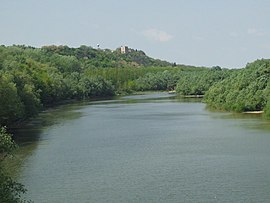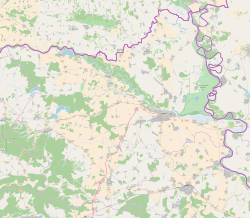Erdut
Erdut
| |
|---|---|
| Municipality of Erdut Općina Erdut Општина Ердут | |
Villages of the Erdut Municipality | |
| Coordinates:45°32′N19°04′E/ 45.533°N 19.067°E | |
| Country | |
| Region | Slavonia(Podunavlje) |
| County | |
| Municipal seat Largest settlement | Erdut(nominal),Dalj(administrative) Dalj |
| Government | |
| • Municipal mayor | Jugoslav Vesić (SDSS) |
| Area | |
| •Municipality | 157.5 km2(60.8 sq mi) |
| • Urban | 30.5 km2(11.8 sq mi) |
| Elevation | 158 m (518 ft) |
| Population (2021)[3] | |
| •Municipality | 5,436 |
| • Density | 35/km2(89/sq mi) |
| •Urban | 561 |
| • Urban density | 18/km2(48/sq mi) |
| Time zone | UTC+1(CET) |
| • Summer (DST) | UTC+2(CEST) |
| Postal codes | |
| Area code | 031 |
| Official languages | Croatian,Serbian[1] |
| Website | opcina-erdut |
Erdut(Serbian Cyrillic:Ердут,[ěrduːt]) is a village and a municipality in easternCroatiasome 37 km east of the major city ofOsijek.Lying on the border with neighbouringSerbia,it was the site of the signing of the 1995Erdut Agreement,which initiated theUNTAEStransitional administration over theEastern Slavonia, Baranja and Western Syrmia.
The village of Erdut is the third largest in the municipality, afterDaljandBijelo Brdo.The municipality is part of theOsijek-Baranja Countyin easternSlavonia.The municipal center is in the largest village of Dalj.
Name and languages
[edit]The name Erdut comes from the localHungarianname (Erdőd) meaning "forest road".[4]In other languages, the village inGermanis known asErdungand inSerbianas Ердут.
Due to the local minority population, the Erdut municipality prescribe the use of not onlyCroatianas the official language, but theSerbian languageandSerbian Cyrillicalphabet as well.[5]
Geography
[edit]The municipality has a total area of 158 km2[6](61 sq mi) and is the largest member municipality ofJoint Council of Municipalities.TheDrava(5.6 km[6]) andDanube(34.825 km[6]) rivers flow through the municipality. The territory of the municipality is completely flat very fertile black soil. The elevation of the village of Erdut is 158 m. It is located at the end of theD213 roadnear border crossing with Serbia. The railway station is located in Novi Erdut (New Erdut) hamlet, about 1 km south of the village, on theVukovar-Erdut-Bogojevo(Serbia) railway.
History
[edit]
The settlement was first mentioned in 1335 under the Hungarian name Erdöd and then as a city in 1472.[4]It was successively ruled byOttoman Empire,Austrian Empire,Austria-Hungary,Kingdom of Yugoslavia,Independent State of CroatiaandYugoslavia.
Croatian War of Independence
[edit]When Croatiadeclared independencefrom Yugoslavia in 1991, eastern Slavonia was soon overrun by theYugoslav People's Armyand Serbparamilitaries,led by the notorious warlord, Željko Ražnatović known by the nameArkan.[7]The battle for Erdut quickly ended that summer as the entireCroatianpopulation was expelled or killed along with other minorities includingCzechs,Germans,Hungarians,RutheniansandUkrainiansin an act ofethnic cleansing.[8]Their homes were soon occupied by other Serbs.[8]Many buildings and homes were destroyed, including theRoman Catholic Church.[8]
Arkan soon set up a training camp for hisSerb Volunteer Guardin Erdut, which became headquarters until the end of the war, when Croatian forces returned according to a peaceful Basic Agreement on the Region of Eastern Slavonia, Baranja and Western Sirmium.
Erdut Agreement
[edit]On November 12, 1995, officials signed what is commonly called theErdut Agreement[9]in which the part of eastern Slavonia still occupied by Serbs would be integrated back into Croatia, gradually allowing some of the exiled refugees to return to their homes. This agreement was the basis for the establishment ofJoint Council of Municipalities.[9]Erdut has been under Croatian control since 1998.[10]
Demographics
[edit]| Year | Pop. | ±% |
|---|---|---|
| 1880 | 9,421 | — |
| 1890 | 10,451 | +10.9% |
| 1900 | 10,904 | +4.3% |
| 1910 | 11,373 | +4.3% |
| 1921 | 10,543 | −7.3% |
| 1931 | 10,976 | +4.1% |
| 1948 | 10,177 | −7.3% |
| 1953 | 10,324 | +1.4% |
| 1961 | 11,440 | +10.8% |
| 1971 | 11,353 | −0.8% |
| 1981 | 11,035 | −2.8% |
| 1991 | 10,197 | −7.6% |
| 2001 | 8,417 | −17.5% |
| 2011 | 7,308 | −13.2% |
| Source: Naselja i stanovništvo Republike Hrvatske 1857–2001, DZS, Zagreb, 2005 | ||
Population
[edit]According to the 2011 census, the municipality has a population is 7,308. The municipal population consists ofSerbs(55,56%),Croats(37,96%) andHungarians(5,06%).[11]
There are 4settlementsin municipality:[12]
| Settlement | population |
|---|---|
| Aljmaš | 610 |
| Bijelo Brdo | 1,976 |
| Dalj | 3,952 |
| Erdut | 818 |
Religion
[edit]Dalj is seat of theEparchy of Osječko polje and Baranjaof theSerbian Orthodox Church.
Politics
[edit]Joint Council of Municipalities
[edit]The Municipality of Erdut is one of seven Serb majority member municipalities within theJoint Council of Municipalities,inter-municipalsui generisorganization of ethnic Serb community in eastern Croatia established on the basis ofErdut Agreement.As Serb community constitute majority of the population of the municipality it is represented by 2 delegated Councillors at the Assembly of the Joint Council of Municipalities, double the number of Councilors to the number from Serb minority municipalities in Eastern Croatia.[13]
Municipal government
[edit]The municipality assembly is composed of 13 representatives. As of 2021, the member parties are:[14]
| Party | Number of votes | Number of seats | |
|---|---|---|---|
| Independent Democratic Serb Party | 1.205 | 8 | |
| Croatian Democratic Union | 698 | 4 | |
| Workers' Front | 141 | 1 |
Minority councils
[edit]Directly elected minority councils and representatives are tasked with consulting the local or regional authorities, advocating for minority rights and interests, integration into public life and participation in the management of local affairs.[15]At the2023 Croatian national minorities councils and representatives electionsHungariansandSerbs of Croatiaeach fulfilled legal requirements to elect 10 members municipal minority councils of the Erdut Municipality.[16]
Economy
[edit]Erdut development index is between 50 and 76% of the Croatian average,[17]and is underdeveloped municipality which is statistically classified as theFirst Category Area of Special State Concernby theGovernment of Croatia.[18]
Culture
[edit]This sectionis written like atravel guide.(March 2014) |
Points of Interest
[edit]

The municipality is home ofEparchy of Osječko polje and Baranja,and there is alsoErdut Castle.
Notable natives and residents
[edit]- Milutin Milanković,born inDalj
- Anton Tittjung,World War II concentration camp guard, who was stripped of his U.S. citizenship for his wartime activities.
See also
[edit]- Erdut Agreement
- Osijek-Baranja County
- Slavonia
- Joint Council of Municipalities
- Cultural and Scientific Center "Milutin Milanković"
- High School Dalj
- List of Croatian municipalities with minority languages in official use
References
[edit]- ^abGovernment of Croatia (October 2013)."Peto izvješće Republike Hrvatske o primjeni Europske povelje o regionalnim ili manjinskim jezicima"(PDF)(in Croatian).Council of Europe.p. 36.Retrieved30 November2016.
- ^Register of spatial units of the State Geodetic Administration of the Republic of Croatia.WikidataQ119585703.
- ^"Population by Age and Sex, by Settlements"(xlsx).Census of Population, Households and Dwellings in 2021.Zagreb:Croatian Bureau of Statistics.2022.
- ^ab"Erdut | Općina Erdut".Opcina-erdut.hr.Retrieved2014-01-31.
- ^Izvješće o provođenju ustavnog zakona o pravima nacionalnih manjina i o utošku sredstava osiguranih u državnom proračunu Republike Hrvatske za 2008. godinu za potrebe nacionalnih manjina, Zagreb, 2009.
- ^abc"Povrsina, stanovnistvo, naseljenost"(PDF).Opcina-erdut.hr. Archived fromthe original(PDF)on 2013-06-22.Retrieved2014-02-21.
- ^"Transcript".Slobodan-milosevic.org. 2004-01-13.Retrieved2014-01-31.
- ^abcThe New York Times;May 10, 1992
- ^ab"Peace Agreements Digital Collection"(PDF).Usip.org. Archived fromthe original(PDF)on 2013-02-01.Retrieved2014-02-21.
- ^"The Thorny Issue of Ethnic Autonomy in Croatia"(PDF).Ecmi.de. Archived fromthe original(PDF)on 2011-03-02.Retrieved2014-02-21.
- ^"Population by Ethnicity, by Towns/Municipalities, 2011 Census: County of Osijek-Baranja".Census of Population, Households and Dwellings 2011.Zagreb:Croatian Bureau of Statistics.December 2012.
- ^"Population by Age and Sex, by Settlements, 2011 Census: Erdut".Census of Population, Households and Dwellings 2011.Zagreb:Croatian Bureau of Statistics.December 2012.
- ^"Konstituisan 6. saziv Zajedničkog veća opština l"(in Serbian). Zagreb: Privrednik. 1 August 2017.
- ^"Konačni rezultati lokalnih izbora 2021 na području općine Erdut".2021-05-19.Retrieved2021-06-09.
- ^"Manjinski izbori prve nedjelje u svibnju, kreću i edukacije".T-portal.13 March 2023.Retrieved2 May2023.
- ^"Informacija o konačnim rezultatima izbora članova vijeća i izbora predstavnika nacionalnih manjina 2023. XIV. OSJEČKO-BARANJSKA ŽUPANIJA"(PDF)(in Croatian). Državno izborno povjerenstvo Republike Hrvatske. 2023. p. 26. Archived fromthe original(PDF)on 3 June 2023.Retrieved3 June2023.
- ^"Odluka o razvrstavanju jedinica lokalne i područne (regionalne) samouprave prema stupnju razvijenosti"(in Croatian). 27 December 2013.Retrieved12 October2015.
- ^Lovrinčević, Željko; Davor, Mikulić; Budak, Jelena (June 2004)."AREAS OF SPECIAL STATE CONCERN IN CROATIA- REGIONAL DEVELOPMENT DIFFERENCES AND THE DEMOGRAPHIC AND EDUCATIONAL CHARACTERISTICS".Ekonomski pregled, Vol.55 No.5-6. Archived fromthe originalon 18 August 2018.Retrieved25 August2018.
External links
[edit]- Official website
 (in Croatian)
(in Croatian)
















